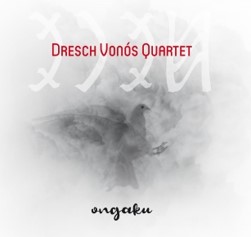|
 In Japanese, ONGAKU means music.
In Japanese, ONGAKU means music.
In Chinese, this punctuation mark is one sign different from medicine. During a rehearsal, when this composition had not yet been given a final name, we had a
hint of oriental cultures. These two concepts can be easily connected with Hungarian thinking as well. The relationship between music and the soul is not a novel idea, its beneficial effects have already been recognized by the ancient Greeks.
I hope this album approaches these two reports.
(Mihály Dresch)
1. Rare dense (traditional) 5.00
2. If I leave (Mihály Dresch) 4.39
3. Plateau (composition for Gyimesi bitter - Mihály Dresch) 6.13
4. Gergely (traditional - Mihály Dresch) 3.15
5. Ongaku (Mihály Dresch)
6. Good news (Mihály Dresch)
7. Field (traditional) 12.08
8. Mezőségi (composition on the subject - Mihály Dresch) 2.58
9. Vadszerba (composition into Serbian melody - Mihály Dresch) 2.20
Mihály Dresch - bass clarinet, fuhun, kaval, soprano saxophone, vocals
Sándor Csoóri - viola, tambourine
Ferenc Zimber - cymbalom
András Bognár - double bass
Hortenzia Lőrincz - voice (track 3.)
|
